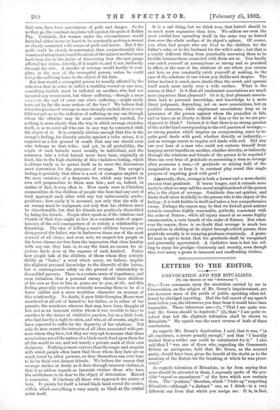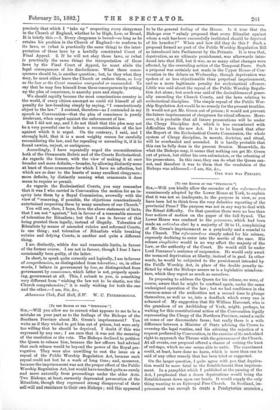LETTERS TO THE EDITOR.
CONVOCATION AND THE RITUALISTS.
[TO THE EDITOR OF THE " sPECT•TOR."l Stn,—Your comments anon the resolution carried by me in Convocation, on the subject of Mr. Green's imprisonment, are one instance more of the perils of public speaking when fol- lowed by abridged reporting. Had the fall report of my speech been before you, the inferences you draw from it would have been impossible. These inferences are—(1), "That I am quite con- tent Mr. Green should be deprived ;" (2), that " I am quite re- solved that not the slightest toleration shall be shown to Ritualists." My speech was the exact reverse of both of these conclusions.
As regards Mr. Green's deprivation, I said, that it was, "in all conscience, a severe penalty enough," and that "I heartily wished that a milder one could be substituted for it." I also said that I " was one of those who, regarding the Ornaments Rubric as ambiguous, held that Mr. Green, as the accused party, should have been given the benefit of the doubt as to the meaning of the Rubric for the breaking of which he was prose- cuted."
As regards toleration of Ritualists, so far from saying that none should be extended to them, I expressly spoke of the pos- sible "repeal or amendment" of the laws which now restrain them. The "position," therefore, which " I take up " respecting Ritualists—although " a distinct " one, as I think—is a very different one from that which you assign me. It.is, in fact,
precisely that which I "take up" respecting every clergyman in the Church of England, whether he be High, Low, or Broad, It is briefly this :-1. Every clergyman is bound—so long as he retains his position: in the Church of England—to conform to its laws, or (what is practically the same thing) to the inter- pretation of those laws by a lawfully constituted Court of Final Appeal. 2. If he will not obey those laws, or (what is practically the same thing) the interpretation of those laws by the Final Court of Appeal, he must abide the legal consequences of his disobedience. What these conse- quences should be, is another question ; but, be they what they may, he must either leave the Church or endure them, so long as the law or the Court remains unrepealed or unamended. To say that he may free himself from these consequences by setting up the plea of conscience, is anarchy pure and simple.
We should rapidly become the most conscientious country in the world, if every citizen amongst us could rid himself of all penalty for law-breaking simply by saying, "I conscientiously .object to the law." I contend, therefore—as I contended in my speech in Convocation—that the plea of conscience is purely irrelevant, when urged against the enforcement of law.
But I did not say, and I do not think that this plea may not be a very powerful one to induce a reconsideration of the law against which it is urged. On the contrary, I said, and I strongly hold, that it is a moat weighty reason for carefully • reconsidering the law, and for repealing or amending it, if it be -found unwise, unjust, or ambiguous.
Accordingly, I have repeatedly urged the reconsideration both of the Ornaments Rubric and of the Courts Ecclesiastical. As regards the former, with the view of making it at once broader and more definite,—broader, by allowing distinctly some at least of those ornaments for which I have no affection, but which are so dear to the hearts of many excellent clergymen ; more definite, by distinctly naming what ornaments it does mean to require or permit.
As regards the Ecclesiastical Courts, you may remember that it was I who carried in Convocation the motion for an in- quiry into them by a Royal Commission, avowedly with the view of "removing, if possible, the objections conscientiously -entertained respecting them by many members of our Church."
You will see, then, I hope, from the above statement of facts, that I am not " against," but in favour of a reasonable amount of toleration for Ritualists; but that I am in favour of this being granted them legally, instead of illegally. Toleration of Ritualists by means of amended rubrics and reformed Courts, is one thing ; and toleration of Ritualists while breaking rubrics and defying Courts, is another and quite a different thing.
I am distinctly, within due and reasonable limits, in favour of the former course. I am not in favour, though I fear I have -occasionally been guilty, of the latter.
In short, to speak quite correctly and logically, I am in favour of comprehension, as distinguished from toleration.; or, in other words, I believe in government by law, as distinguished from government by connivance, which latter is not, properly speak- ing, government at all. This, I submit to you, is something very different from "wishing the law not to be elastic, nor the Church comprehensive ;" it is really wishing for both the one and the other.—I am, Sir, &c.,
„dthenmum Club, Pall Mall, S.W. W. C. PETERBOROUGH.



































 Previous page
Previous page